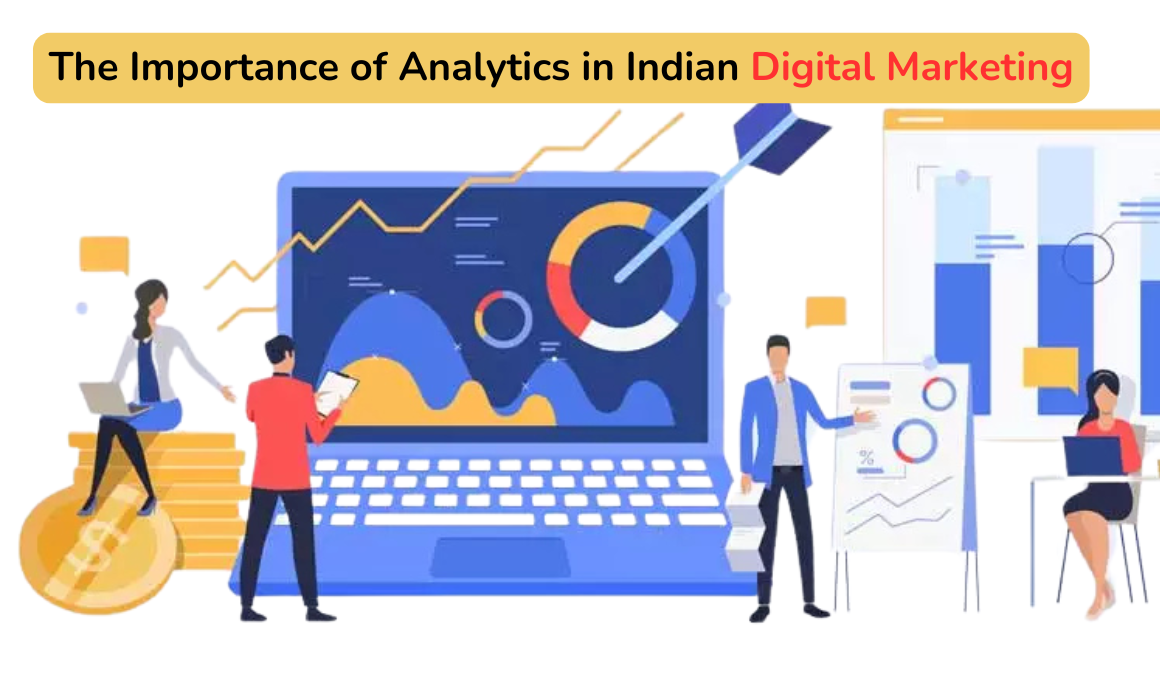
In today’s digital landscape, the importance of analytics in marketing cannot be overstated. As businesses in India strive to establish a strong online presence, leveraging data-driven insights has become crucial for achieving success. Moreover, analytics enables marketers to understand consumer behavior, refine strategies, and measure campaign effectiveness, ultimately leading to increased conversions and revenue. At Digital Mart Lab, located in Lucknow, we recognize the significance of analytics in shaping digital marketing strategies. In this blog post, we will explore the vital role analytics plays in Indian digital marketing, discussing its features, pros and cons, and how our services at Digital Mart Lab can help businesses leverage analytics effectively.
Understanding Digital Marketing Analytics
To begin with, digital marketing analytics involves the collection, measurement, and analysis of data related to online marketing campaigns. It encompasses various metrics, including website traffic, user engagement, conversion rates, and social media performance. By analyzing this data, businesses can gain valuable insights into their target audience and tailor their marketing efforts accordingly.
Key Features of Analytics in Digital Marketing
Data Collection and Tracking: Analytics tools enable marketers to gather data from multiple sources, such as websites, social media platforms, and email campaigns. This comprehensive data collection provides a holistic view of customer interactions.
Performance Measurement: By tracking key performance indicators (KPIs), businesses can assess the effectiveness of their marketing strategies. For instance, metrics such as click-through rates (CTR), bounce rates, and return on investment (ROI) help gauge campaign success.
Customer Segmentation: Furthermore, analytics allows businesses to segment their audience based on demographics, behaviors, and preferences. This segmentation enables personalized marketing, ensuring that the right message reaches the right people.
A/B Testing: In addition, marketers can use analytics to conduct A/B tests, comparing different versions of ads or landing pages to determine which performs better. This iterative approach fosters continuous improvement.
Predictive Analytics: Advanced analytics tools employ machine learning algorithms to forecast future trends and consumer behavior. This foresight aids businesses in making proactive marketing decisions.
Pros of Using Analytics in Digital Marketing
- Informed Decision-Making: With google analytics, businesses can make data-driven decisions rather than relying on assumptions. Consequently, this reduces the risk of failure and enhances the chances of success.
- Improved ROI: By understanding which marketing channels yield the best results, businesses can allocate their budgets more effectively. This optimization, in turn, leads to a higher return on investment.
- Enhanced Customer Experience: Analytics helps identify customer pain points and preferences, allowing businesses to tailor their offerings to meet customer needs. As a result, this personalized approach enhances customer satisfaction and loyalty.
- Competitive Advantage: Companies that leverage analytics effectively gain a competitive edge in the market. By understanding industry trends and consumer behavior, they can adapt quickly to changes and stay ahead of competitors.
- Measurable Results: Moreover, analytics provides concrete data that enables businesses to measure the success of their marketing efforts. This transparency fosters accountability and encourages teams to strive for better results.
Cons of Using Analytics in Digital Marketing
- Complexity: While analytics offers valuable insights, the data can be overwhelming, especially for businesses lacking experience in data analysis. Without the right expertise, organizations may struggle to interpret the data effectively.
- Cost: Additionally, investing in advanced analytics tools and software can be expensive. Consequently, smaller businesses may find it challenging to allocate budgets for these resources.
- Privacy Concerns: The collection of user data raises privacy issues. Therefore, businesses must navigate regulations and ethical considerations to ensure they handle customer information responsibly.
- Dependency on Data: Relying too heavily on analytics may stifle creativity. While data is essential, marketing strategies should also incorporate innovative ideas and human intuition.
- Inconsistent Data: Lastly, inaccurate or inconsistent data can lead to misleading conclusions. Thus, ensuring data integrity is crucial for effective analytics.
The Role of Analytics in Digital Marketing Strategies

As digital marketing continues to evolve, businesses must adapt their strategies based on real-time data. Here are some ways analytics can influence digital marketing efforts:
Website Optimization
To begin with, analytics provides insights into user behavior on a website. By analyzing metrics such as page views, average session duration, and exit rates, businesses can identify areas for improvement. For example, if users frequently exit a particular page, it may indicate that the content is not engaging enough or that the page takes too long to load. At Digital Mart Lab, our team uses analytics to optimize websites according to your preferences, ensuring a seamless user experience that drives conversions.
Targeted Advertising
Additionally, analytics allows businesses to create targeted advertising campaigns. By segmenting audiences based on their interests and behaviors, marketers can deliver personalized ads that resonate with potential customers. This targeted approach not only improves engagement but also increases the likelihood of conversions. Most customers who take services from Digital Mart Lab appreciate our ability to craft tailored advertising strategies based on analytical insights.
Social Media Marketing
Moreover, social media platforms generate vast amounts of data, and analytics is essential for measuring the success of social media campaigns. By tracking engagement metrics such as likes, shares, and comments, businesses can determine which types of content resonate with their audience. This understanding enables marketers to refine their social media strategies, focusing on the platforms and content that yield the best results. With years of experience in social media marketing, Digital Mart Lab excels at creating impactful campaigns based on analytics.
Email Marketing Campaigns
Furthermore, analytics plays a vital role in optimizing email marketing campaigns. By analyzing open rates, click-through rates, and conversion rates, businesses can gauge the effectiveness of their email content. A/B testing different subject lines or call-to-action buttons can lead to higher engagement and conversions. At Digital Mart Lab, we emphasize data-driven email marketing strategies that cater to your business needs and preferences.
Content Marketing
Understanding audience preferences through analytics is crucial for developing effective content marketing strategies. By analyzing which types of content drive traffic and engagement, businesses can create more of what their audience wants. Whether it’s blog posts, videos, or infographics, leveraging analytics helps ensure content aligns with audience interests, thereby improving overall performance.
Choosing the Right Analytics Tools
Selecting the appropriate analytics tools is essential for effective data analysis. Here are some popular analytics tools that businesses can consider:
- Google Analytics: A powerful and free tool that tracks website traffic, user behavior, and conversion rates. It provides detailed reports and insights for optimizing marketing strategies.
- Social Media Analytics Tools: Platforms like Hootsuite, Sprout Social, and Buffer offer social media analytics to measure engagement and performance across different channels.
- Email Marketing Analytics: Tools like Mailchimp and Constant Contact provide insights into email campaign performance, helping businesses optimize their email marketing efforts.
- Customer Relationship Management (CRM) Systems: CRMs like Salesforce and HubSpot include analytics features that help track customer interactions and engagement throughout the sales funnel.
- A/B Testing Tools: Platforms such as Optimizely and VWO enable businesses to run A/B tests and analyze which variations perform better.
Conclusion
In conclusion, the importance of analytics in Indian digital marketing cannot be understated. As businesses navigate the competitive landscape, leveraging data-driven insights is crucial for informed decision-making, improved ROI, and enhanced customer experiences. At Digital Mart Lab, located in Lucknow, we pride ourselves on offering a comprehensive range of digital marketing services, including social media marketing and website optimization, tailored to your business needs and preferences.
With our years of experience and commitment to delivering the best offers to our clients, most customers choose to work with Digital Mart Lab rather than others. We understand that each business is unique, and our approach is designed to align with your goals and objectives. By making data-driven decisions, you can ensure your marketing efforts yield the best results.
If you’re ready to take your digital marketing to the next level, look no further than Digital Mart Lab in Lucknow. We specialize in creating websites and strategies that resonate with your audience, ultimately driving growth for your business. Visit us at www.digitalmartlab.in to learn more about our services and how we can help you succeed in the digital world. Let us help you turn data into actionable insights that propel your business forward!



